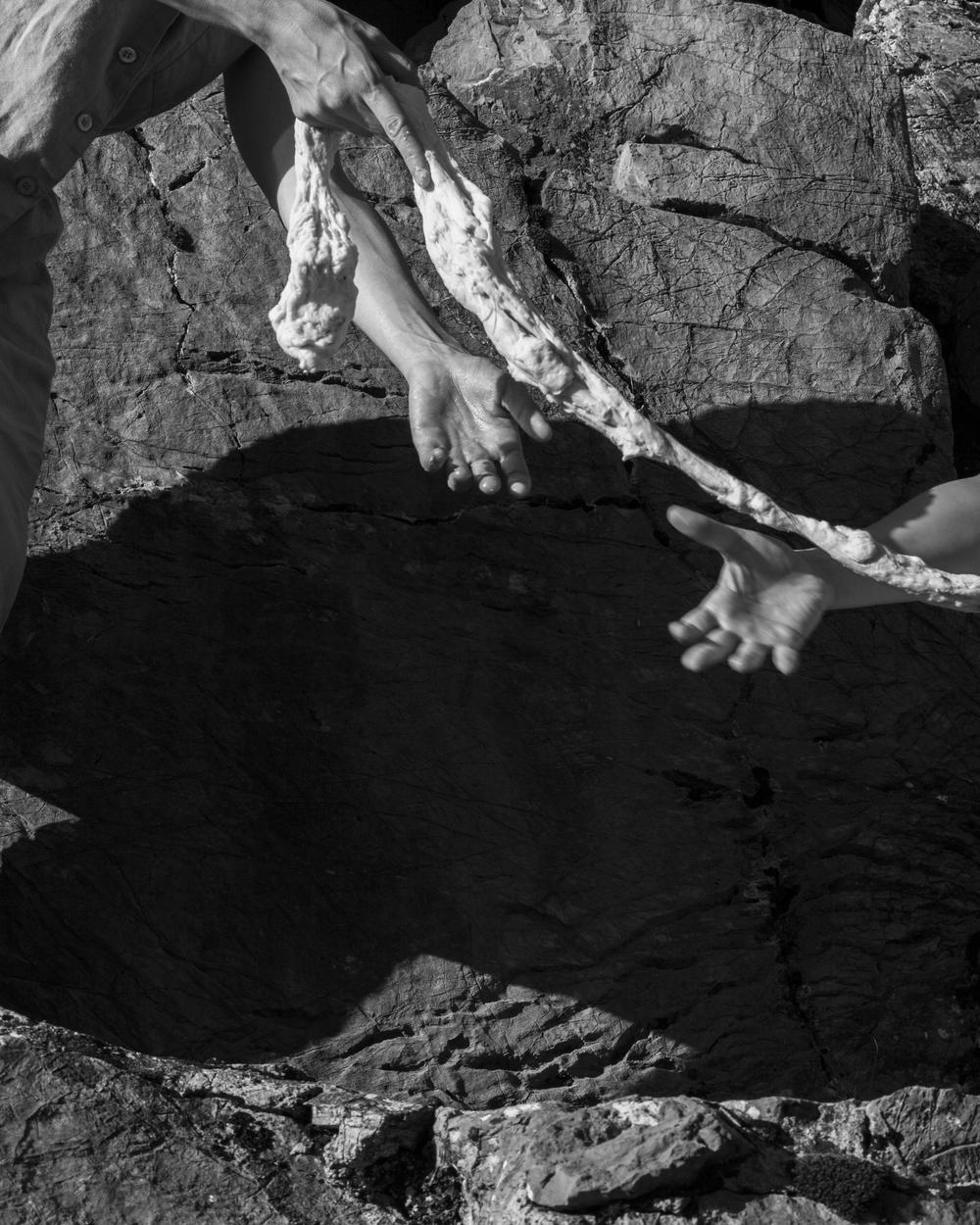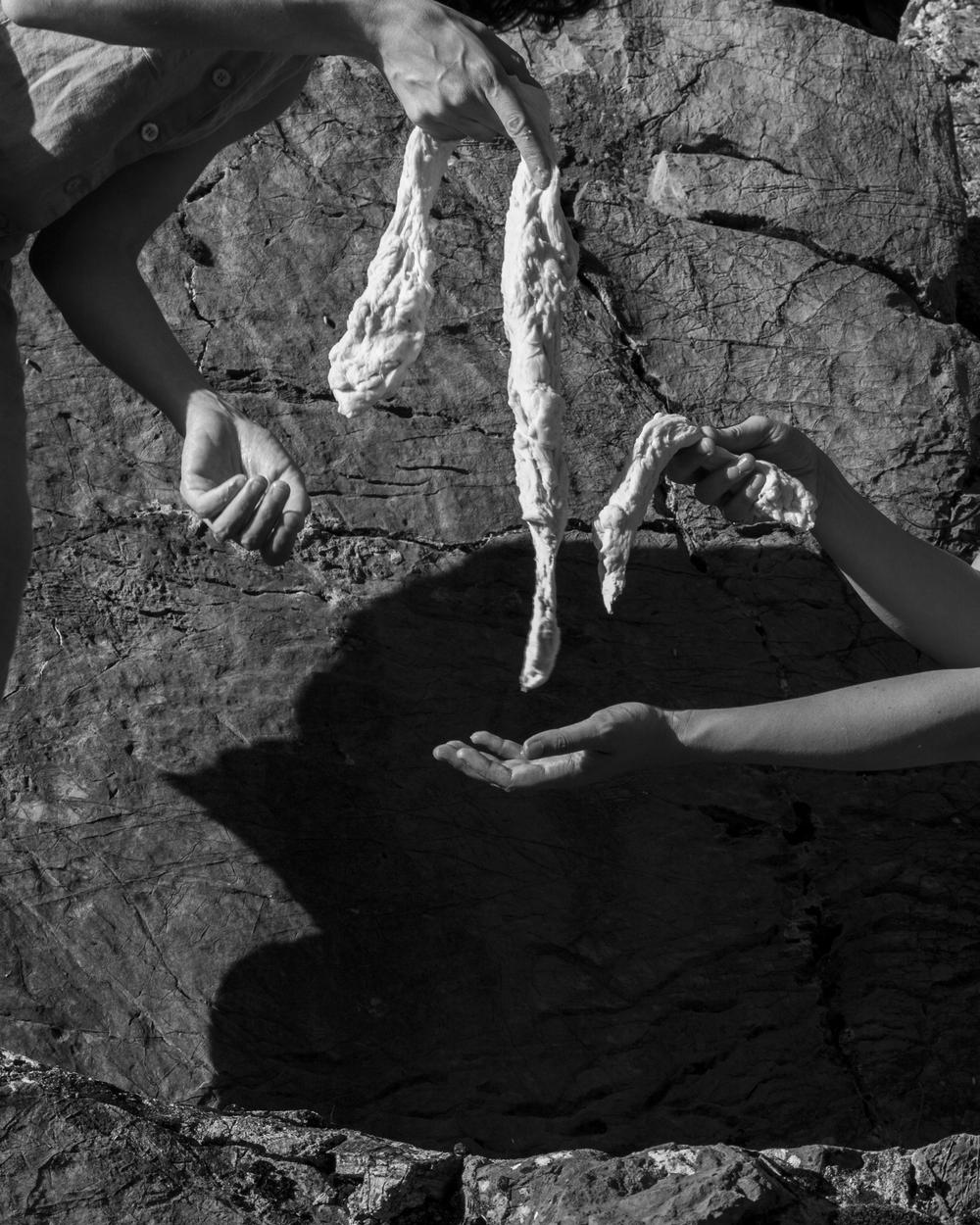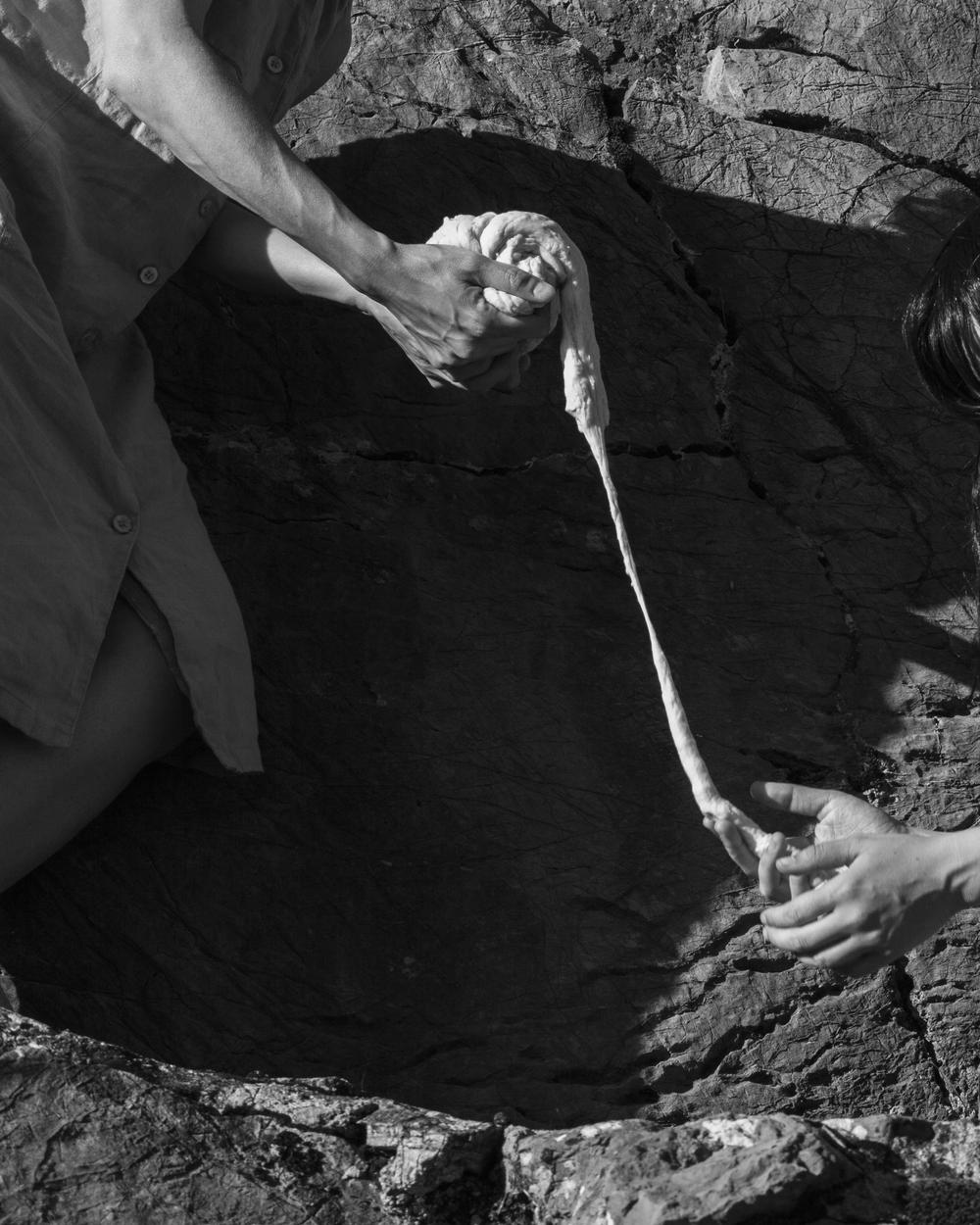Bread Day
Olive B. Godlee
→ BFA SC 2019
Photographs by Shterna Goldbloom
→ MFA PH 2019
 Shterna Goldbloom, Friday Morning Waiting, 2016.
Shterna Goldbloom, Friday Morning Waiting, 2016.I’ve spent the past several months making bread. I am no great talent, but even when a loaf of bread does not succeed the way I hope it to, it almost always teaches me something new about the variables of the environment, the materials I’m using, and the way I move my hands. And it’s almost always still edible.
Bread is easy to make, but has an infinite number of alterations and specificities. To achieve a certain crumb, crust, flavor, color, or texture, each aspect of the bread must be considered. Today, I measure 1,000 grams of flour, then 780 grams of 94°F water, and then I mix them with my right hand in a large bowl until they’re just combined. I’ll do all the mixing by hand; it’s much easier to listen to the dough by touch than by sight. I mix to combine and fold to add strength. Twelve hours later, the dough is twice as big as when I started and is nearly spilling out of the bowl, large bubbles at its surface. From there, it will need to be halved and shaped and placed into two smaller bowls covered in linen towels dusted with flour, and the knowledge that it needs this care is the only thing that gets me up with the first of many alarms that ring every morning. And even though I think I’ll be able to go back to sleep, I always end up waiting at the kitchen table, in the company of the proofing loaves and preheating oven. If all goes as planned and the house is warm enough and I don’t do any of the math wrong, there are two loaves of bread on the table by 9:30 AM. Their crusts are dark and they steam and crackle as they settle in a 70ºF room after being in a 500ºF dutch oven.
I have considered all the variables in my kitchen. I have thought about time and temperature and the way I move my hands. I think this is good bread. It smells like good bread. It tastes like good bread. But if I make bread from flour that is void of nutrients and unsustainably produced, is it good bread? If I want to learn to make good bread, shouldn’t I be considering variables at every stage of the process—from care of the soil to distribution—not just the ones in my kitchen?
As I became immersed in bread-making, I was reading Octavia Butler’s Parable of the Sower. Written in 1993 but set in the 2020s, Butler’s imagined near-future dystopia was informed by injustices of her present, and what might happen if oppressive forces such as capitalism, mass incarceration, and environmental damage continued unchecked. The heroine, Lauren Oya Olamina, responds to the societal collapse by creating her own religion, called Earthseed, which prioritizes community and education. Reading this novel as a cautionary tale rather than a fictional dystopia, I embraced Butler’s solutions. In order to combat forces of inequity, oppression, and prejudice, we must learn how to learn, how to adapt, how to ask questions, how to listen, and how to embrace fumbling.
In learning how to make bread, I was overcome by the magic of a rising dough, the beauty of a scored crust, the air pockets in the crumb created by gaseous bubbles, and the ability to make delicious, nourishing food from just flour, water, salt and (sometimes) yeast. Quickly, though, I became self-conscious about the quality and was overwhelmed by how much more I had to learn—it seemed once I figured out one thing, I would lose my grasp on the previous technique. At the same time, bread-making felt like the only aspect of my life that didn’t have real consequences. Even if I made a loaf I thought had failed, it would still be eaten, and I still would learn from it.
Trying to do something you don’t know is emotional and fraught; fumbling while bread-making is learning how to learn. A practice of fumbling can aid in becoming more comfortable with being uncomfortable, stretching the muscle needed to be humble and engaged rather than defensive and resolute. Making bread requires looking around yourself, being aware, asking questions, sharing extra loaves, and bringing others into the fold. We think better when we’re fed, anyway.
 Shterna Goldbloom, Can you?, 2016.
Shterna Goldbloom, Can you?, 2016.For the past two years, Anya Talatinian has been building a bread oven in the courtyard of Mass Art for the annual Green Arts Festival. The same fire bricks are used each year, and each year they blacken and warp with use. Based on the design of Peter Schumann of Bread and Puppet, the bricks stack in such a way that enables them to support themselves, trap heat, release smoke, and create a pocket for fire and dough.
Anya and I met through a mutual friend a while ago, and I’ve always liked them—they’re the kind of person who lets you know they see you. One of the first few times we hung out was with a large group of people. We were on our way to the beach and I wasn’t wearing the right clothes and everyone but me knew all the words to the album we were listening to. Sitting in the passenger seat of our friend Lid’s car, they took out a keychain-sized purple notebook and started writing in it—they had to scrunch their entire body to be able to write so small. They ripped out the page and passed it to me in the backseat. On one side it said, “Would you like a coconut bar?” and on the other side, “It isn’t your birthday, but you deserve a treat!”
Since then, Anya and I have had many late night calls; even after a long day, we’d get really riled up—about bread. At our respective kitchen tables, only a city apart, we yelled about dough and community and compassion to each other through our computers. We’d both been thinking about bread for a while, and there was so much information to catch up on and share.
These conversations felt like finally sharing a secret you’ve been holding onto with someone who thinks it’s as chewy as you do. These conversations felt like finally sharing a secret you’ve been holding onto with someone who thinks it’s as chewy as you do—tripping over your words because you discovered something connected to everything you’ve been thinking about and you can’t even get a sentence out because it’s just too exciting that someone else has had a similar half-thought and maybe those half-thoughts make a whole when you put them together?? Or maybe you can figure out how to translate each other’s words into something shared beyond the table/computer/oven? And isn’t it exciting to revel in the idea that sharing half-thoughts is okay?
The most exciting thing about bread, which I discover and rediscover with every conversation, is that everyone has a connection to it. Everyone has a story about it or knows someone who makes it; or they make it themselves or they remember a damn good loaf they ate once; or they know someone who knows someone who mills their own flour or lives near a wheat field or has built an oven.
And so gathering with Anya during this year’s Green Arts Festival, we attempted to build this oven with bricks that didn’t fit quite how they should’ve. We asked a whole bunch of people to help us, all who had brilliant half-thoughts or nearly-whole ones or even a smudge of an idea about bricks or building or fire or bread. On one of the first real cold days of this fall, thirty or so students in Anya’s program formed a brigade to haul two hundred fire bricks out of the basement, through a window, and into the middle of the courtyard at Mass Art. They then stayed with us outside for nearly five hours, all of us underdressed for the unexpected cold, figuring out how to stack two hundred bricks to make an oven.
Fumbling through the process of stacking eventually allowed us the means to get warm, and the next day the means to fumble through bread with some of the same (and a lot of new) people. Watching people mix ingredients, spill flour, knead dough, shape loaves, split wood, and stoke the fire in the brick oven, I imagined how this space could grow.
 Shterna Goldbloom, What’s the time?, 2016.
Shterna Goldbloom, What’s the time?, 2016.My mother bakes her famous challah every Friday; it is a full-day process. When I am missing her I think of her warm challah smell and being wrapped in a bear hug.
Olive B. Godlee is wondering where all the dyke bars went.
Shterna Goldbloom is a feygele who wants free flight for all feygeles.